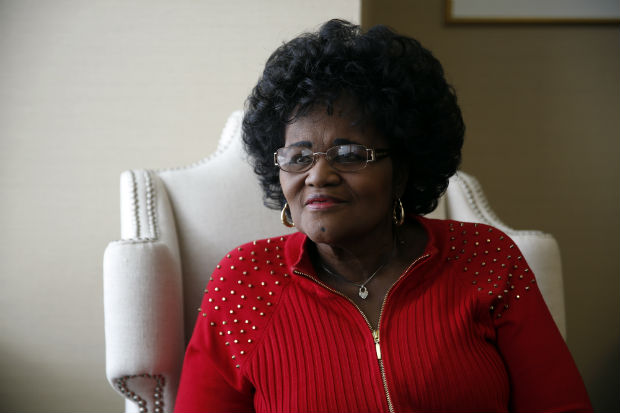African-American mothers wonder if their lost babies are still alive

In this April 29, 2015 photo, Zella Jackson Price poses for a photo at her attorney’s office in Clayton, Mo. Eighteen black women who were told decades ago that their babies had died soon after birth at a St. Louis hospital now wonder if the infants were taken away by hospital officials to be raised by other families. AP
LOUIS — Eighteen black women who were told decades ago that their babies had died soon after birth at a St. Louis hospital now wonder if the infants were taken away by hospital officials to be raised by other families.
The suspicions arose from the story of Zella Jackson Price, who said she was 26 in 1965 when she gave birth at Homer G. Phillips Hospital in St. Louis. Hours later, she was told that her daughter had died, but she never saw a body or a death certificate.
No one is sure who was responsible, but Price’s daughter ended up in foster care, only to resurface almost 50 years later. Melanie Gilmore, who now lives in Eugene, Oregon, has said that her foster parents always told her she was given up by her birth mother.
READ: Stolen baby found in South Africa after 17 years
Price’s attorney, Albert Watkins, is asking city and state officials to investigate. In a letter to Gov. Jay Nixon and St. Louis Mayor Francis Slay, Watkins said he suspects the hospital coordinated a scheme “to steal newborns of color for marketing in private adoption transactions.”
Gilmore’s children recently tracked down her birth mother to mark their mother’s 50th birthday. The search led them to the now 76-year-old Price, who lives in suburban St. Louis.
In March, an online video caused a sensation when it showed the moment that Gilmore, who is deaf, learned through lip reading and sign language that her birth mother had been found.
READ: Viral Facebook post helps abandoned child reunite with relatives
The two women reunited in April. DNA confirmed that they are mother and daughter.
“She looked like me,” said Price, a gospel singer who has five other children. “She was so excited and full of joy. It was just beautiful. I’ll never forget that,” she said of the reunion.
After the reunion, Watkins started getting calls from other women who wondered if their babies, whom they were told had died, might have instead been taken from them.
Their stories, he said, are strikingly similar: Most of the births were in the mid-1950s to mid-1960s at Homer G. Phillips. All of the mothers were black and poor, mostly ages 15 to 20.
In each case, a nurse — not a doctor — told the mother that her child had died, a breach of normal protocol. No death certificates were issued, and none of the mothers were allowed to see their deceased infants, Watkins said.
“These are moms,” he said. “They are mothers at the end of their lives seeking answers to a lifelong hole in their heart.”
He plans to file a lawsuit seeking birth and death records. None of the women are seeking money, he said.
Watkins said he has no idea who, or how many people, may have been responsible if babies were taken. He believes the infants were stolen and put up for adoption in an era when there were few adoption agencies catering to black couples.
Homer G. Phillips Hospital opened in 1937 as a blacks-only hospital at a time when St. Louis was segregated. Even after desegregation in the mid-1950s, the hospital served predominantly African-American patients.
The hospital closed in 1979. Messages seeking comment from officials at the St. Louis Health Department were not returned.
Price said she gave birth to a baby girl born two months’ premature on Nov. 25, 1965. The baby weighed just over 2 pounds (0.91 kilograms) but Price was able to hold the crying child after birth.
A nurse took the baby away and came back an hour later. The little girl was struggling to live, Price was told. She might not make it.
Shortly thereafter, the nurse came back. The baby, she said, was dead.
Price recovered in the hospital for two more days, in a ward surrounded by happy mothers.
“It was depressing to see when they rolled the babies in and they were taking them to their mothers, but I didn’t have my baby,” she recalled.
Gussie Parker, 82, of St. Louis, heard Price’s story and was shocked by the similarities with her own life. Parker gave birth to a premature girl on Nov. 5, 1953.
Initially, she said, the child seemed fine. A short time later, a nurse told her that her daughter had died.
“I never did see the baby or get a death certificate,” said Parker, who has another daughter, Diane, who works for The Associated Press in New York. “When you’re young and someone comes and tells you that your baby’s dead, in those days you accepted it.”














